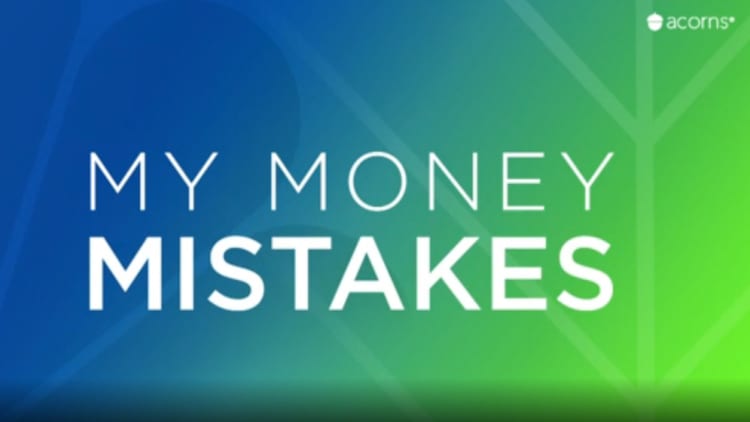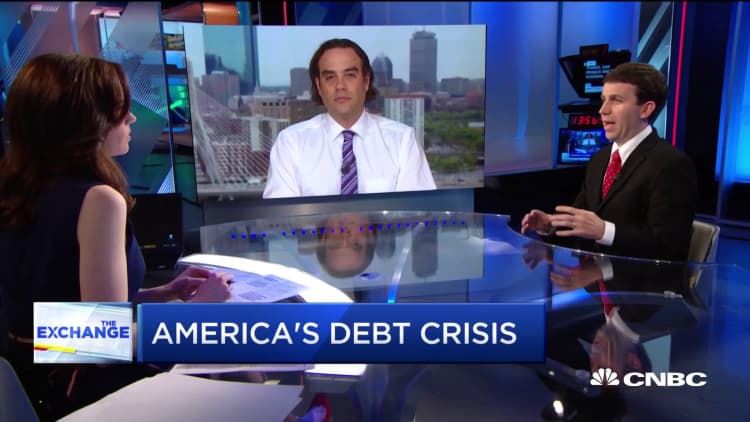
All of us make poor money decisions and while many seem innocent at first — drinks with friends, a sudden shopping spree — these bad habits can end up costing you in the long run.
CNBC asked its employees to offer some of their most common money mistakes. Staffers gave various answers but there were three avoidable consumer habits that topped the list: dining out, credit card debt from college, and impulse purchases.
Dining out
A CNBC national survey in partnership with SurveyMonkey, conducted in June 2019 examined the spending behavior of over 2,000 Americans. While more than half, 54%, believed they were savers, 28% of respondents said they spend more than $200 on takeout and food delivery each month.
CNBC's own Kelly Evans and Dominic Chu both admit that they should be dining out less and saving more.
"My biggest money mistake — I am eating it," said Evans, anchor of "The Exchange."
Food purchases are a bigger problem than you may think. A survey conducted by LendEDU found that 49% of millennials spend more on dining out than they put towards retirement.
Many young people straight out of school likely haven't set up a retirement account, especially if their employer does not offer an employer-sponsored program, Mike Brown, a research analyst at LendEDU, told CNBC Make It. "They have likely been paying for coffee and dining out for quite some time. So it would make sense that a solid contingent is spending more each month on one thing than saving for retirement."
The obvious answer to lowering dining out costs is cooking more meals at home and bringing your lunch to work. Preparing meals at home can not only save you money but reconnect with the food you eat every day.
Student credit card debt
A common response from CNBC staffers: Their biggest money mistake was made in college, and it was not taking out a student loan. It was credit card debt they accrued after opening an account as a student.
"They offer you a free t-shirt if you open up a credit card. The credit card debt lasted a lot longer than the t-shirt did," said one CNBC staffer.
Data from CreditCards.com.report finds that people with consumer debt are often enticed by credit card sign-up bonuses, zero-percent interest offers, and cashback programs.
Recent research from the New York Federal Reserve reveals that credit card delinquencies are on the rise. Among Americans age 18 to 29, credit card delinquencies of 90 days or greater surpassed 8% of balances, hitting an eight-year high. More than half of those in their 20s (52%) now have credit cards, compared with only 41% in 2012.
Dan Primack, business editor at Axios, pointed to the overall strength of the American economy as a factor increasing debt levels. The Great Recession is a distant memory to many of today's college students.

Impulsive purchases
The third money mistake we heard a lot about from CNBC staffers was impulsive purchases.
In the CNBC-SurveyMonkey spending study from June, all age groups of men admitted they were bigger impulse buyers than woman. According to the Invest In You survey, 58% of people said their last impulse purchase was made for something less than $100.
"None of my clients have spent on anything huge", Diane Nissen, a budgeting specialist at Alexandrite Group. Clients that come with large credit card debt don't usually have boats or excessive houses or even a large item they are paying off. Instead, it's smaller purchases that add up, and that individuals do not realize they are racking up before it is too late.
More from Invest In You
Three ways to start investing when you know nothing about the stock market
Your parents tell you to invest in bonds? They had no idea what was coming
Five mistakes novice investors make and how to prevent them
West Monroe Partners, a consulting firm, asked 2,500 people to guess how much they spend on subscription services. Their answer: $79 a month. Their actual average spend: $237.
Maintaining a personal budget can help, but the problem, according to personal finance coach Ramit Sethi is that budgets don't work for most people. It can be difficult to track of every purchase and getting started can seem too demanding. However, there are behavioral changes you can make to keep better track of your money.
For instance, get in the habit of checking your bank accounts every day or two. If you're more conscious about your spending you are more likely to save.
Clint Haynes, a certified financial planner in Kansas City, Missouri, suggests looking at the entire financial picture and being more formal with a budget plan. He marks down fixed costs, such as rent and car payments. He then adds the amount he needs to save in order to reach his goals. Whatever is leftover gets put into his spending pile.
"If you like getting a coffee every day [and] it makes you feel good, then get the coffee every day," said Haynes. "As long as [you're] saving enough money on a monthly basis to achieve [your] goals"
CHECK OUT: 3 simple ways to save an extra $200 every month via Grow with Acorns+CNBC.
Disclosure: NBCUniversal and Comcast Ventures are investors in Acorns.






